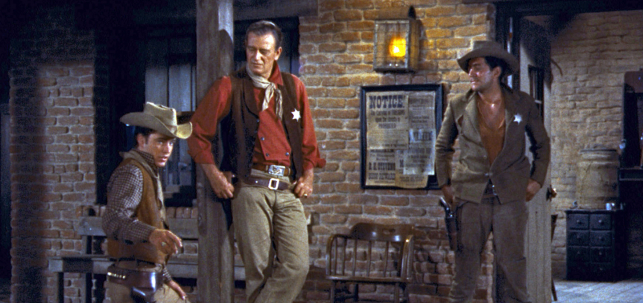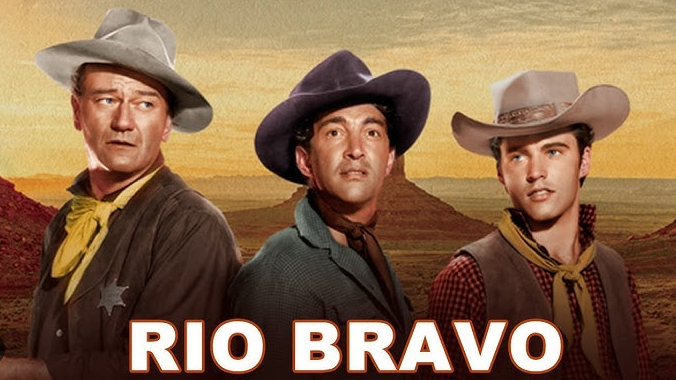Rio Bravo (1959)
🏜️ Introduction: A Western That Redefined the Genre
Released in 1959, Rio Bravo is more than a Western — it’s a statement. A defiant response by director Howard Hawks and actor John Wayne to the rising wave of “message” Westerns like High Noon (1952), Rio Bravo champions the values of loyalty, quiet courage, and old-school grit. It replaces moral ambivalence with moral clarity, without ever losing nuance or charm.
At its core, the film is about a small-town sheriff defending the law with limited help, but it’s also a meditation on redemption, friendship, and what it means to stand your ground — even when the odds are stacked against you.
🔫 Plot Summary: A Town Held Hostage by Power and Pride
Sheriff John T. Chance (John Wayne) arrests Joe Burdette, the spoiled brother of a powerful rancher, for murder. But holding Joe in jail is just the beginning. As Burdette’s men begin to close in on the small town of Rio Bravo, Chance must fend off rescue attempts while waiting for the U.S. Marshal to arrive — which could take days.
His allies?
- Dude (Dean Martin), a once-great deputy turned alcoholic who’s haunted by failure.
- Stumpy (Walter Brennan), a cranky but loyal old man guarding the jail with a shotgun.
- Colorado (Ricky Nelson), a sharp young gunslinger who joins them out of principle.
- And Feathers (Angie Dickinson), a bold and mysterious woman whose presence brings unexpected fire — and tenderness — to Chance’s hardened world.
With gunmen lurking in the shadows and pressure mounting, the sheriff and his ragtag team must rely on strategy, bravery, and trust. It’s not about winning a war — it’s about holding the line.
🎭 Character Study: Grit, Grace, and Growth
John T. Chance is classic John Wayne: firm, restrained, and principled. He doesn’t ask for help — but he values it. He respects strength, not noise. His growth lies not in learning to shoot, but in learning to let people in.
Dude is the soul of the film. Dean Martin delivers a surprisingly deep, tragic performance as a man climbing back from the depths of addiction and shame. His redemption arc is one of the most poignant in Western cinema.
Stumpy provides levity, but never becomes comic relief. He’s loyal, capable, and proves that age does not erase usefulness. Brennan’s chemistry with Wayne adds heart to the story.
Colorado isn’t just the “young gun” trope — he represents the future, observing the older men, learning, and stepping up when it counts.
Feathers, portrayed by Angie Dickinson, is one of the most compelling female characters in any Western of the era. She’s not a damsel, nor a simple love interest — she challenges Chance, matches him in spirit, and softens his walls without compromising her own strength.

🎬 Direction and Style: Hawksian Mastery
Howard Hawks doesn’t rush action. Instead, he builds rhythm and tension through character interplay. Long conversations, silent glances, and loaded pauses speak louder than bullets. When the action arrives, it’s sharp, fast, and purposeful — not spectacle, but punctuation.
The film’s setting — the jailhouse, the saloon, the empty streets — becomes its own character. Hawks uses confined spaces to intensify drama, highlighting the psychological siege these men are under.
And let’s not forget the “My Rifle, My Pony, and Me” duet — a quiet, soulful musical interlude that humanizes these characters in a way few Westerns dare.
🎯 Themes and Legacy
- Redemption: Rio Bravo is a story of fallen men rising again.
- Honor vs. Help: Unlike High Noon, where the sheriff begs for help, Rio Bravo says: choose your team wisely, then trust them to stand with you.
- Masculinity with vulnerability: Strength here is not brute force, but the ability to wait, endure, and choose action only when it matters.

Critics and filmmakers have hailed Rio Bravo as one of the greatest Westerns of all time. Quentin Tarantino has cited it as a personal favorite, and its structure has influenced everything from Assault on Precinct 13 to The Mandalorian.
🧨 Conclusion: A Western That Stands the Test of Time
Rio Bravo isn’t flashy — it’s measured, grounded, and brimming with dignity. It’s a film about people who don’t talk too much, but when they do, every word matters. It reminds us that heroism isn’t about size or numbers — it’s about resolve. And sometimes, the bravest thing you can do is not run.
More than sixty years later, Rio Bravo still resonates. Not just as a Western, but as a statement of character — and a celebration of the quiet strength that holds the line when lawlessness comes knocking.
⭐ Final Rating: 9.0/10
A masterclass in restrained storytelling, unforgettable characters, and the kind of moral clarity that never goes out of style.
